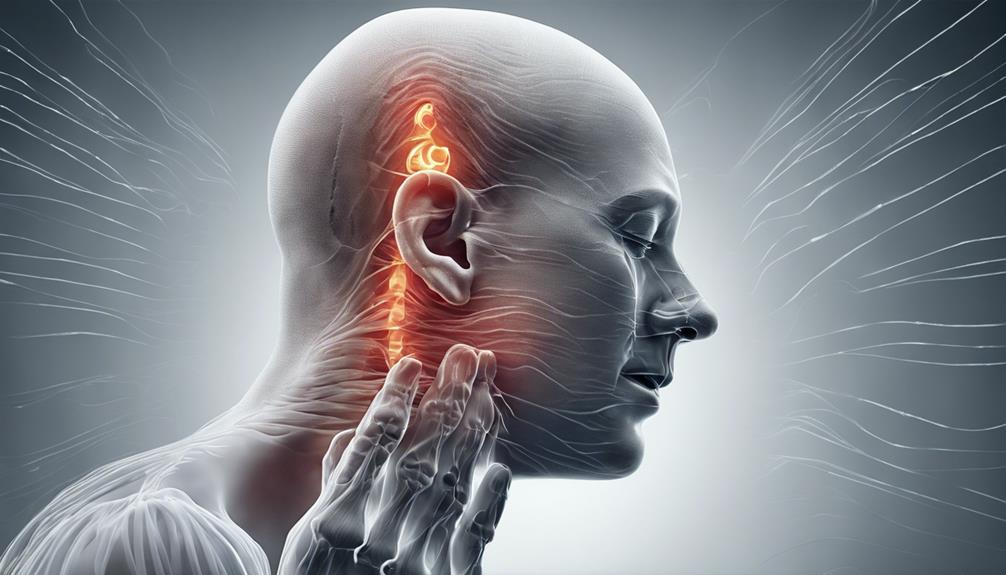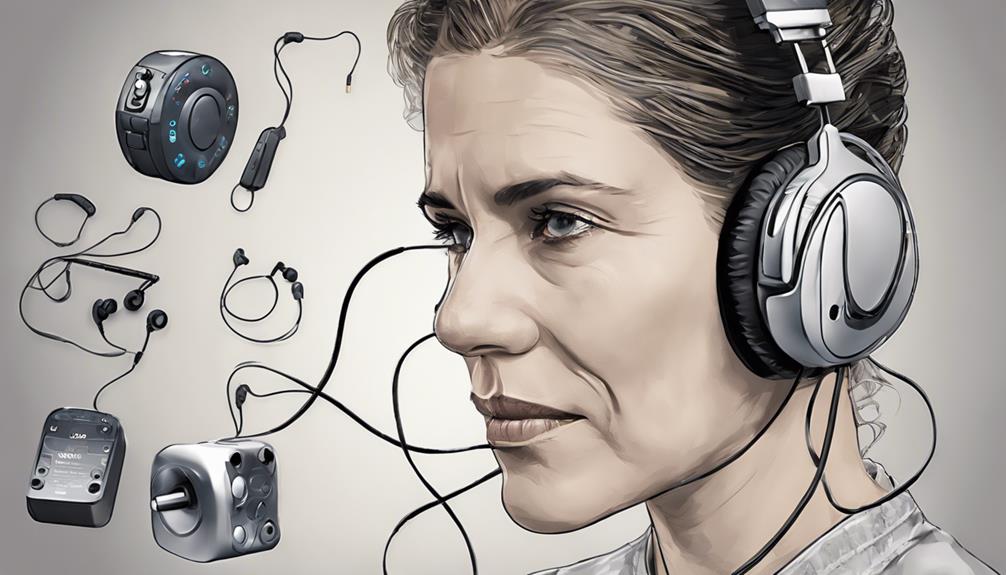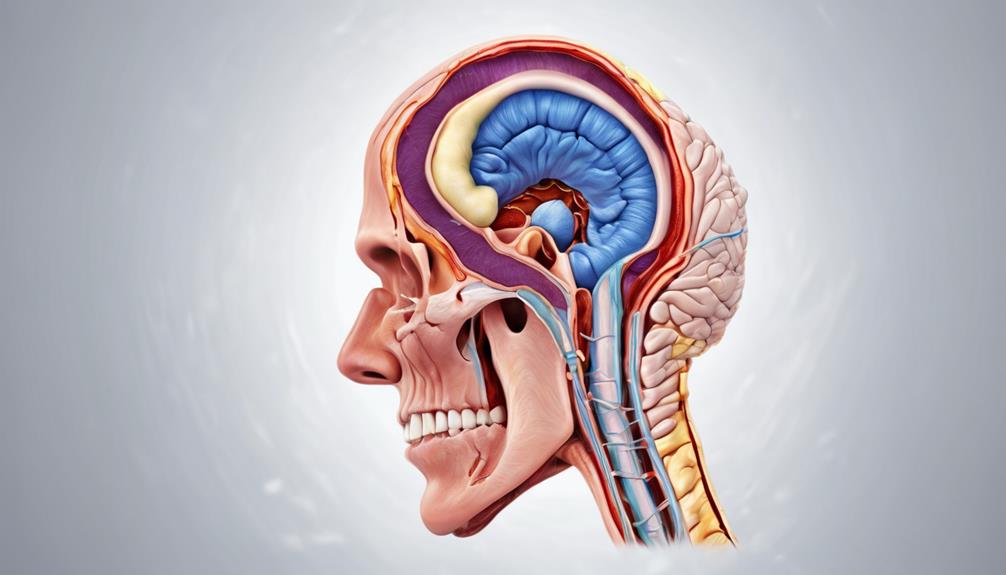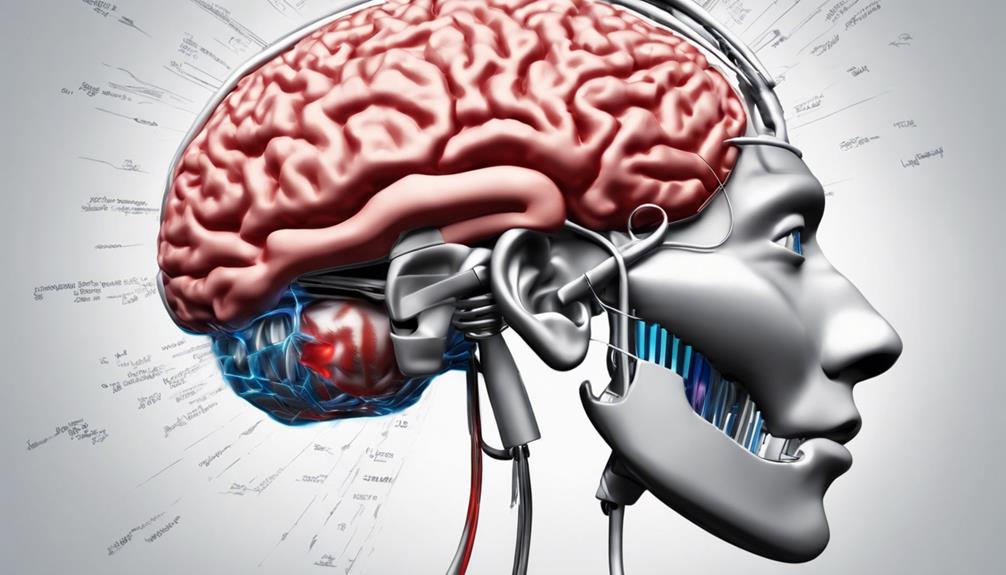Investigating the maze of head injuries and its complex relationship with hearing impairment is like deciphering a complex network of enigmas within the world of medical challenges.
As we navigate through the intricate pathways of auditory impairment post-injury, a deeper understanding emerges, shedding light on the profound effects trauma can have on our ability to perceive sound.
Join us on this journey as we unravel the secrets behind how head trauma can intricately intertwine with the delicate mechanisms of our hearing system, shaping a comprehensive guide to this lesser-known aspect of post-injury complications.
Key Takeaways
- Head trauma can lead to various types of hearing loss, affecting sound conduction and processing.
- Diagnosing post-head trauma hearing loss requires specialized tests and ENT consultations.
- Treatment options include rehabilitation programs, hearing aids, and, in severe cases, surgical interventions.
- A comprehensive evaluation considering both mechanical and neurological aspects is crucial for effective management.
Causes of Hearing Loss Post Head Trauma
Head trauma can lead to hearing loss through various mechanisms, including mechanical damage to ear structures and disruptions in the brain's processing of auditory information. In head injury patients, traumatic brain injury can cause damage to the temporal bone, leading to issues like Sensorineural Hearing Loss.
Skull fractures resulting from head trauma can impact the inner ear directly, affecting sound transmission. Moreover, the inner ear's delicate structures can sustain injuries during head trauma, affecting hearing functionality.
Additionally, memory loss associated with traumatic brain injury may indirectly contribute to hearing problems by affecting the brain's ability to process auditory information efficiently.
Understanding the complex interplay between head trauma and hearing loss in head injury patients is crucial for providing targeted interventions and improving overall outcomes. Therefore, thorough evaluation and management of both the mechanical and neurological aspects of hearing loss post head trauma are essential for optimal patient care.
Impact on Ear Anatomy
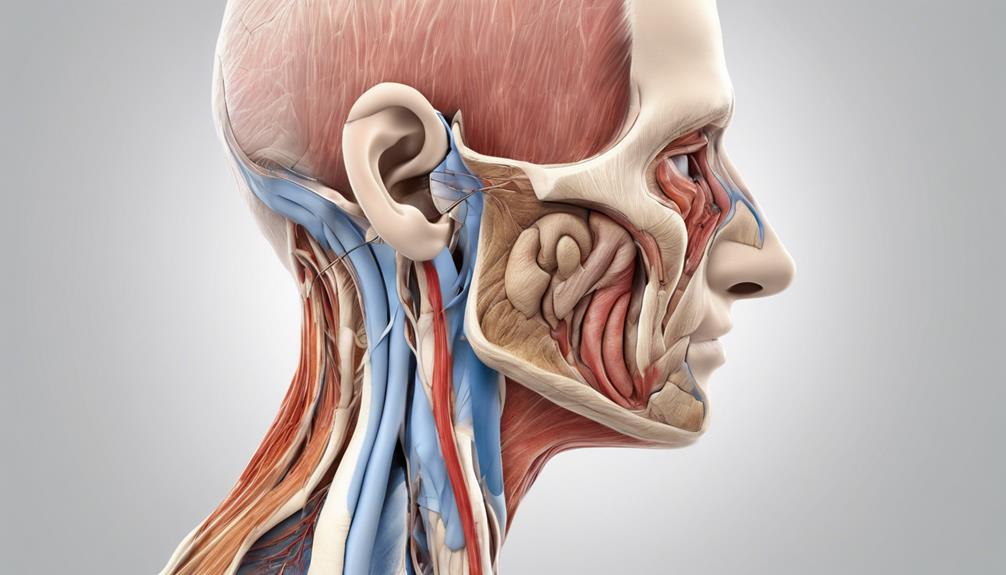
When considering the impact of head trauma on ear anatomy, one must recognize the potential for significant disruptions to the delicate structures responsible for auditory processing. Head trauma can result in various injuries to the ear, such as ruptured eardrums, dislocated ossicle bones, and damage to the auditory nerve. These injuries can directly interfere with the transmission of sound signals to the brain, leading to hearing loss. Additionally, damage to the inner ear structures from head trauma can disrupt the proper functioning of the auditory system, further contributing to hearing difficulties.
Mechanical injuries to the ear's anatomy, such as fractures or dislocations, can specifically cause conductive hearing loss post head trauma. Furthermore, disruption in the inner ear's delicate structures like the cochlea can impede the processing of sound signals, affecting the overall auditory function. Understanding the intricate relationship between head trauma and ear anatomy is essential for accurate diagnosis and effective treatment of hearing loss post-injury.
Types of Hearing Loss Post Injury
Exploring the varied manifestations of hearing loss following a traumatic head injury reveals a spectrum of conditions that can impact auditory function significantly. When considering the aftermath of a head injury, it's crucial to understand the diverse types of hearing loss that may arise:
- Conductive Hearing Loss: This type of hearing impairment stems from mechanical damage that disrupts the transmission of sound to the brain. It often occurs when there are obstructions or injuries in the outer or middle ear, hindering sound conduction.
- Labyrinthine Concussion: Characterized by damage to the delicate structures of the inner ear, labyrinthine concussion not only affects hearing but also disrupts balance. This dual impact can lead to vertigo and difficulties with spatial orientation.
- Meniere's Syndrome: Individuals experiencing Meniere's syndrome may encounter vertigo, hearing loss, tinnitus, and a sensation of fullness in the affected ear. This condition, associated with the inner ear, can significantly impact an individual's quality of life post head injury.
Diagnosing Hearing Loss

After understanding the diverse types of hearing loss that can result from traumatic head injuries, the next critical step involves diagnosing the extent and specific nature of the auditory impairment. Diagnosis typically includes a series of tests to assess hearing function. These tests may involve audiometer tests to measure the individual's ability to hear different frequencies accurately. Additionally, tuning fork tests can help evaluate the individual's ability to hear sounds through bone conduction. Whisper tests may also be conducted to assess the individual's ability to hear whispered speech. In some cases, referral to the Ear, Nose, and Throat (ENT) department for further evaluation may be necessary.
For a more comprehensive assessment, consultation with an audiologist is highly recommended. Audiologists specialize in diagnosing and managing hearing-related issues, including those stemming from head trauma. They may perform more specialized tests like Distortion product otoacoustic emissions (DpOAE) testing to evaluate the function of the outer hair cells in the cochlea. Identifying the type and degree of hearing loss is crucial for developing an effective treatment plan tailored to the individual's needs.
Treatment Options for Hearing Loss
Rehabilitation programs, surgical procedures, hearing aids, and cochlear implants are among the treatment options available for addressing hearing loss resulting from head trauma. When considering treatment for head trauma-induced hearing loss, it's crucial to consult with an audiologist to determine the most effective approach.
- Rehabilitation Programs: These programs focus on enhancing auditory skills and adapting to hearing loss. They may include auditory training, speechreading exercises, and strategies to improve communication in various environments.
- Hearing Aids: Hearing aids can significantly improve communication, independence, and overall quality of life for individuals experiencing hearing loss post-head injury. They work by amplifying sounds, making them clearer and easier to understand.
- Surgical Procedures: In some cases, surgical interventions like cochlear implants may be necessary to restore hearing function. However, non-invasive treatments should be explored first, and the decision for surgery should be made in consultation with medical professionals specializing in hearing loss management. Proper management of even mild hearing loss can lead to substantial improvements in hearing outcomes.
Frequently Asked Questions
How Does Head Trauma Cause Hearing Loss?
Head trauma can cause hearing loss by damaging the auditory pathway, leading to issues like ruptured eardrums or severed auditory nerves. This interruption in sound transmission can result in hearing impairment, even with intact ear function.
Understanding the effects of head trauma on ear anatomy is crucial for addressing post-injury hearing problems. It's essential to recognize these mechanisms to provide effective treatment for individuals experiencing hearing loss due to head injuries.
Can Hearing Loss Be Caused by Trauma?
Yes, hearing loss can indeed be caused by trauma. Injuries to the head can lead to various issues affecting the auditory system, such as ruptured eardrums or damage to auditory nerves. These traumas can disrupt the transmission of sound signals, resulting in hearing loss.
Seeking prompt evaluation and diagnosis post-trauma is crucial for appropriate treatment. Trauma-induced hearing loss can have diverse causes and presentations, necessitating tailored interventions for optimal outcomes.
What Is the Most Common and Serious Complication of a Significant Head Injury?
The most common and serious complication of a significant head injury is traumatic brain injury (TBI). TBI can result in long-term cognitive, physical, and emotional issues. It can lead to permanent disabilities, including memory problems, impaired movement, and changes in sensory functions like hearing and vision.
Preventive measures are crucial as head injuries causing TBI often result from falls, motor vehicle accidents, sports injuries, or assaults.
Can an Old Head Injury Cause Problems Years Later?
Yes, old head injuries can indeed cause problems years later. It's crucial to understand that the effects of head trauma may not always show up immediately.
Over time, scar tissue, nerve damage, or secondary complications can lead to delayed onset of hearing issues.
Monitoring our hearing health regularly and seeking medical evaluation for any new or worsening symptoms post head injury is essential for timely intervention.
Conclusion
In conclusion, navigating the intricate pathways of head trauma-induced hearing loss is like unraveling a complex tapestry of interconnected threads. Understanding the causes, impact on ear anatomy, types of hearing loss, diagnostic methods, and treatment options is key to untangling this intricate web of challenges.
By delving deep into the science behind it, we can shed light on the path towards better management and rehabilitation of hearing loss post head trauma.

